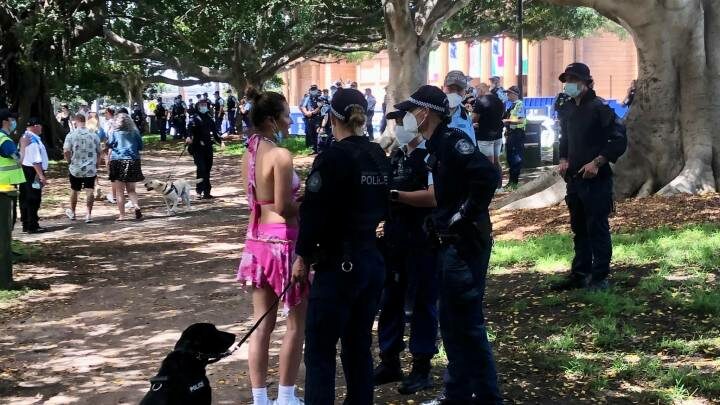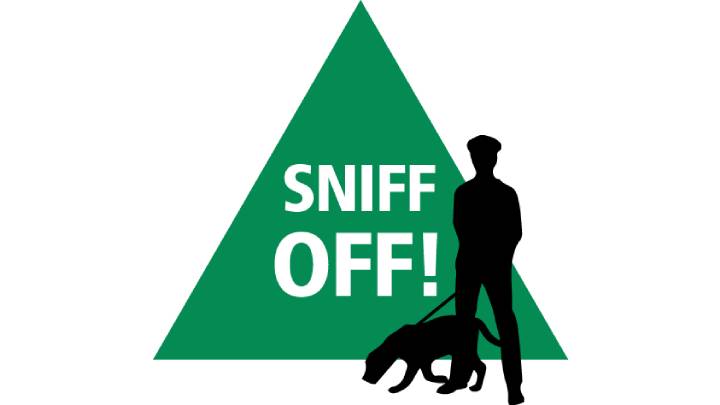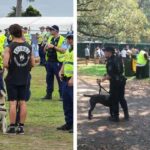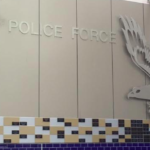“Brute Force and Paternalistic Grand Standing”: Sniff Off’s Olivia Barlow on NSW Police Drug Dog Use

After near on two years of the NSW government having relied on local police to heavy-handedly enforce health measures via the threat of monetary penalisation, and, if that didn’t work, brute force, premier Dominic Perrottet has let the COVID Omicron variant rip through the community.
So, with more time on its hands, NSW police is back to its usual public fronting operations, targeting young people at music festivals with drug detection dogs, saturation officer presence, and, when they can’t easily find any substances in a punter’s pocket, forcing them to strip off in front of them.
New Year’s Day saw this kick back in. Masses of NSW police officers swarmed the entrances to Field Day 2022 at the Sydney Domain, with a total of 85 festivalgoers arrested, only two of whom were charged with supply, while 81 copped a personal possession charge.
As NSW Greens MLC David Shoebridge has been requesting the data from the police minister for a decade, we know that many more Fair Day patrons would have been searched for no reason, as, at such events, around 50 percent of searches after a dog indicates result in no drugs being found.
However, regarding sniffer dog operations elsewhere, when police search civilians following a positive indication from a canine, they find nothing two-thirds to three-quarters of the time.
Lost freedoms
Back in the 1990s, NSW police didn’t scour trains stations, music festivals or pubs with drug detection dogs. Prior to the turn of the century, police officers didn’t employ the mass strip searching of youths in order to enforce some archaic drug laws around personal possession.
With the coming of the 2000 Sydney Olympics, though, the NSW Police Force acquired a sniffer dog unit to use during the international event. And once it was over, police then turned the dogs on the community, via laws which permit their warrantless use in certain public areas.
Over the last decade, dog operations have increasingly been accompanied by strip searches. Shoebridge obtained figures showing that over the four years to June 2018, strip search use had increased by 47 percent and, on average, 64 percent of these searches turned up nothing.
As Sniff Off campaign assistant Olivia Barlow points out, so ubiquitous are drug dogs that when COVID prevented the Splendour in the Grass festival last year, the alternative online Splendour XR required patrons to walk past computer-generated officers and dogs to enter the virtual event.
Ending the drug war
Anti-drug detection dog campaign Sniff Off was established by Shoebridge and the NSW Young Greens in 2011, with the aim of raising public awareness to the warrantless use of drug dogs in public by NSW police, and the harms these operations result in.
Since 2014, the campaign has allowed concerned members of the public to alert its Facebook page to the whereabouts of drug dog operations as they take place and, in turn, Sniff Off then tips off its followers about them.
Sydney Criminal Lawyers spoke to Sniff Off’s Olivia Barlow about the brute force that young people going out are now subjected to, the heightened harms associated with illicit substances when drug dogs are deployed, and why she believes that MDMA and cannabis should be legal and regulated.

On New Year’s Day, the NSW police were out in force at Fair Day, with saturation presence, drug dogs and accompanying strip searches. They arrested 85 people: 81 on personal possession charges and only two on supply.
Sniff Off has been tracking this sort of behaviour, as it’s build up, over the last decade. Olivia, from what you’ve heard, was the police operation really worth it considering its size and outcomes?
Absolutely not. The Sniff Off page received reports all morning about the police presence at Field Day. Concertgoers told us they felt like they were headed into a prison rather than an event.
NSW police ruined the buzz of approximately 12,000 people wanting to celebrate the new year together, just to take a personal stash from 81 of them.
This had almost zero impact on overall drug consumption at the event. This was a negligent use of our taxpayer dollars.
This was a classic example of a general trend in NSW towards a more in-your-face, proactive policing style.
The aggressive use of dogs and heightened visibility tactics are symptoms of the “broken windows” attitude towards policing, ushered in by commissioners Scipione and Fuller.
This has seen a deliberate shift in focus from community safety and harm reduction towards targets, quotas, revenue raising and, in this case, posturing at festival entrances.
This was the first big police crackdown at a youth festival since the lockdowns were lifted. However, it’s occurred as cases of the virus are surging throughout the community.
Police often make the case that the reason they’re confronting festivalgoers with brute force, dogs and invasive searches is that it’s for their own good, as it’s preventing them from taking dangerous drugs.
What would you say is missing from the equation when NSW police trot out this justification?
All this aggression and cost by police fails to achieve its public objective: it’s not preventing people from taking drugs.
We have seen multiple heart-breaking cases at festivals where young people trying to avoid the police either take all their drugs at once or preload so much that they become seriously ill or die when they finally arrive.
High visibility operations and dogs aren’t preventing people from taking drugs, instead they’re encouraging more dangerous drug-taking practices by making people fearful of their presence.
This conclusion is not just from anecdotal reports, it’s confirmed by recent Coroner’s Court findings.
These discretionary police powers inevitably see cops unfairly targeting people of colour – especially First Nations people – and LGBTQIA+ people. This can produce an unnecessary, violent escalation during these stops.
All drugs have the potential to cause harm. All drugs can be dangerous whether legal or illegal. The stigma we’ve attached to particular drugs, whilst endorsing others, is primarily cultural and ideological in nature.
Substances, like cannabis and MDMA, don’t have an inherent moral value or intrinsic ties to criminality, and their use absolutely does not justify the heavy-handed tactics police employ to “save us from ourselves” – or the obscene police budgets required to pay to badly police them.
The Sniff Off Facebook page has been posting public announcements about the whereabouts of NSW police drug dog operations when they’re underway at places, like train stations, since 2014.
What has this type of police activity been like of late? And why is your group alerting the public to police actions which are sanctioned under state laws?
We did see less drug dog activity during lockdowns, but what we continued to observe was the use of brute force and high visibility approaches to managing the public.
You can’t use brute force to prevent people from taking drugs and, not surprisingly, you can’t use it to prevent the spread of a virus either.
It was disturbing to see punitive responses to communities already struggling with the financial and mental health burdens of the pandemic.
A bizarre COVID twist came with the virtual drug dogs at the virtual Splendour XR. This admittedly made for a hilarious meme, but underlying their presence was a transparent and desperate attempt to normalise the presence of police and drug dogs at festivals.
Actions like this are aimed at two things: justifying record police expenditure and maintaining an in-your-face presence in the community. No one is being prevented from taking drugs by a digital dog.
After almost eight years of the Sniff Off page, it is now widely accepted that drug dog operations are a criminal waste of time and money.
For many young people, Sniff Off continues to provide a critical public service by letting them know where the dogs are so they can avoid these nasty confrontations with police.
As mentioned, NSW police maintains that these operations are necessary to prevent people taking dangerous drugs, as well as in its attempts to curb the drug trade.
So, given these concerns, what’s the alternative approach that Sniff Off recommends?
Brute force and paternalistic grand standing isn’t convincing anyone to stop taking drugs, and, in fact, it’s actively making drug use more dangerous.
Rather than pouring money into high visibility operations that encourage dangerous drug use and unfairly target already marginalised groups, we recommend legalising MDMA and cannabis.
This is a way of controlling supply – making drugs even less dangerous – and encouraging open conversations about how to consume safely.
Legalisation will take significant revenue from organised crime and allow for real cuts to police and gaol budgets and to redirect that money to public services.
It’s a win-win for everyone but cops and criminals.
The last decade has seen a massive spike in the number of regular people being made to strip in front of armed and uniformed officers in relation to these operations. The drug dogs have been circulating in the community for the past two decades.
So, going back prior to 2001, NSW youths didn’t have these invasive measures as an ordinary part of going out to attend an event, or even catching a train for that matter.
As a younger person, what sort of impact do you think having drug dogs and strip searches as an average part of going out is having on current generations?
I recently read Pleasure Consuming Medicine by Kane Race, where he looks at the intersections of queer culture and drug culture against the backdrop of Sydney’s party scene in the 1990s.
As someone who was very much preoccupied with Pokèmon and playing tip for most of that time, it’s hard to imagine the Sydney he describes.
The NSW I’ve grown up in is filled with nostalgia for a cultural scene that is long dead – destroyed by successive puritan governments. Millennials experienced very little of this party scene, but there is still a deep sense of longing for the nightlife we could have known.
As for Gen Z? If they can overcome their social anxiety enough to go out, they’re more dismissive of the NSW police state, laughing at how transparent a revenue raising scheme it is when the cops trot the dogs out, or they’re talking about their plans to move to Melbourne or Adelaide to avoid being stripped in front of their mates.
They don’t take things quite so personally, it seems, or maybe they’re so preoccupied with the impending doom of climate change, they haven’t time to worry.
This is just what nightlife looks like to Gen Z – they’ve never known anything different, and they don’t see it changing any time soon.
Is it any wonder nobody wants to go out anymore?

And lastly, Olivia, as we’re two years into a pandemic, the reports that police were back out there cracking down heavily at one of the first music festival events that have been allowed to take place since the lifting of the lockdowns, came as a bit of a shock.
Given this, what do you expect we’ll be seeing moving into 2022? And what will Sniff Off be doing to counter it?
Based on the build-up we saw of drug dog actions leading up to Christmas and New Year’s Eve, I honestly can’t say it came as a shock to me or the Sniff Off community.
There was anger, yes, and disbelief at the numbers – but the idea that there was going to be a massive police presence at festivals across the board was already a given.
In the brief period between Delta and Omicron, report after report came to us – from the few people brave enough to venture out – of dogs combing the empty streets of Kings Cross or monitoring Newtown Station for hours on end.
The joke was made by many – and often – that there were more cops in venues than patrons.
But the police almost seem emboldened by their largely unquestioned military deployment across marginalised Sydney communities during the pandemic.
We had multiple reports of police searching people inside a club in full view of other patrons.
At this point, these operations have been going on for so long that people are almost tired of questioning them, as they’re so used to seeing them out.
We need to resist this as much as possible. And as exhausting as it is, we need to continue to question ballooning police budgets and advocate for the community’s rights in the face of cops.
We have to resist the normalisation of this brute force policing. It is not normal.
How are we going to do that? By continuing to report drug dog sightings across social media to help people avoid these nasty confrontations.
By continuing to inform people about their rights when it comes to their encounters with police to ensure they can protect themselves.
By continuing to question the police minister about the police actions he endorses, and the exorbitant budget required for them.
By continuing to push for independent oversight and review of the NSW police to hold them accountable, not only for their actions, but to change the toxic culture within it.
And, of course, by continuing to advocate for decriminalisation and legalisation of cannabis and MDMA.







